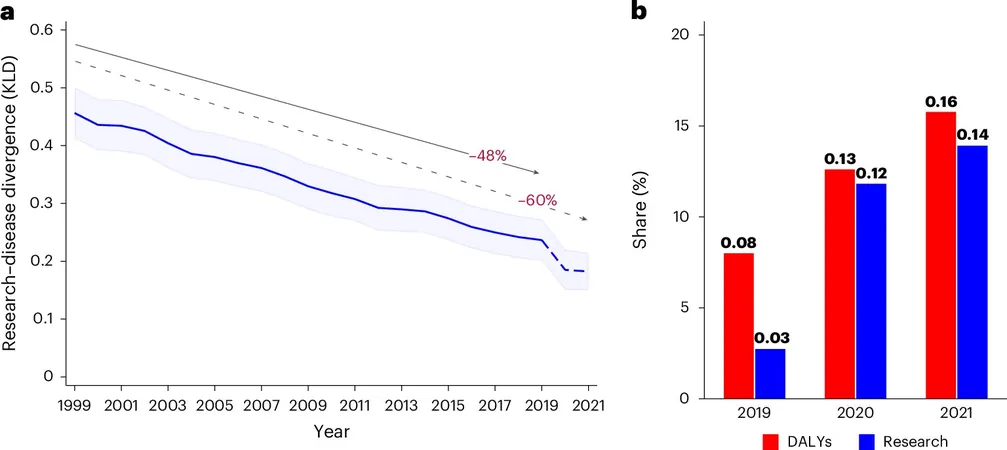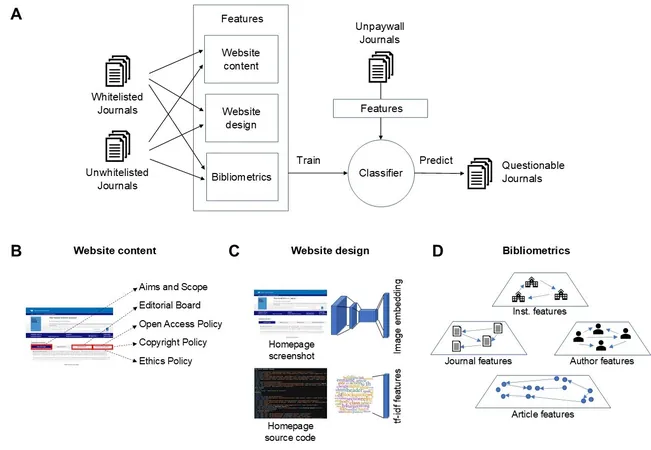
Global Health Research Faces New Challenges: Is A Crisis Looming?
2025-09-02
Author: Rajesh
The Good News and the Bad News
In a revealing new study, global health researchers have delivered a mixed bag of insights regarding the alignment between health research and the actual disease burden affecting populations worldwide. While there's been some progress since 1999—narrowing the gap between research focus and prevailing health needs—the optimism is clouded by concerning trends, particularly as potential U.S. funding cuts loom.
The Accidental Alignment
The observation that health research often misses the mark isn't new, with historical data showing a shocking 10% of funding directed to diseases that account for 90% of global health issues. However, this latest study offers a fresh perspective, employing advanced AI techniques to analyze an astonishing 8.6 million research papers over the last two decades. They discovered that improvements in research alignment were largely incidental, driven by a global health landscape that altered to better match existing research interests.
Impending Widening of the Gap
As strides in public health have diminished the impact of communicable diseases, we're now seeing a rise in chronic diseases, particularly those common in Western nations. The study indicates a troubling future: a dichotomy where local communicable diseases have seen a reduction in research divergence by about 75%, whereas global non-communicable diseases have experienced a 25% increase.
The Paradox of Research Focus
Researchers emphasize that much of the current focus on chronic diseases is heavily concentrated in Western contexts, often overlooking the unique challenges faced in low-resource settings. This growing disconnect poses a real risk as disease patterns evolve globally.
COVID-19: A Cautionary Tale
The COVID-19 pandemic starkly contrasts the study's key findings. As the pandemic escalated, scientists rapidly redirected their efforts towards infectious diseases, quadrupling research output in this area. This anomaly underscores the research community's potential to adapt but also highlights a troubling inconsistency in priority setting.
Funding Cuts: A Recipe for Disaster
The study raises alarms about upcoming potential cuts in U.S. funding for global health initiatives, which could undo two decades of progress in aligning research with pressing health needs. With 84% of U.S. global health funding recently directed to Sub-Saharan Africa, the ramifications of such cuts could be dire, affecting key areas like HIV/AIDS and tuberculosis research.
A Call for Action: The Path Forward
To avert an escalating crisis, the authors advocate for a concerted global initiative aimed at re-aligning research with actual health needs. They suggest: supporting stable governance structures for sustained funding; investing in locally-led research to build long-term solutions; and promoting open science to improve transparency and real-time response to evolving health challenges.
Conclusion: The Urgency of Staying Aligned
As we stand on the brink of significant challenges in global health research, a proactive approach is necessary. With careful coordination and investment, the research community can bridge the widening gap and ensure that efforts genuinely reflect the health needs of communities around the globe.




 Brasil (PT)
Brasil (PT)
 Canada (EN)
Canada (EN)
 Chile (ES)
Chile (ES)
 Česko (CS)
Česko (CS)
 대한민국 (KO)
대한민국 (KO)
 España (ES)
España (ES)
 France (FR)
France (FR)
 Hong Kong (EN)
Hong Kong (EN)
 Italia (IT)
Italia (IT)
 日本 (JA)
日本 (JA)
 Magyarország (HU)
Magyarország (HU)
 Norge (NO)
Norge (NO)
 Polska (PL)
Polska (PL)
 Schweiz (DE)
Schweiz (DE)
 Singapore (EN)
Singapore (EN)
 Sverige (SV)
Sverige (SV)
 Suomi (FI)
Suomi (FI)
 Türkiye (TR)
Türkiye (TR)
 الإمارات العربية المتحدة (AR)
الإمارات العربية المتحدة (AR)